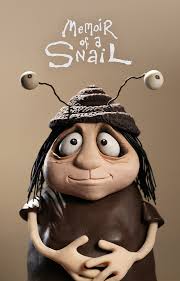
MEMOIR OF A SNAIL
Australia, 2024, 94 minutes, Colour.
Sarah Snook, Kodi Smit-McPhee, Jacki Weaver, Magda Szubanski, Dominique Pinon, Eric Bana, Nick Cave, Adam Elliot, Tony Armstrong, Paul Capsis.
Directed by Adam Elliot.
Quite a striking experience. However, the title might be a bit offputting to some audiences, especially those with a fear of snails, Molluscophobia (seeing ‘snails and slugs as slow, writhing anomalies in a city full of things that flutter, stomp or scuttle’. But, reassuringly, snails here have some heroic status.
Melbourne animator, Adam Elliot, won an Oscar for his short film, Harvey Krumpet. His animation style is stop-motion, and he uses clay models, giving his films a distinctive look, and, combined with his idiosyncratic characters and their stories, something of a unique position in animation. In 2008 he directed Mary and Max (admirably voiced by Toni Collette and Philip Seymour Hoffman), the story of two lonely characters’ correspondence between Melbourne and New York.
Which means that his new film is visually distinctive and admirably voiced. Adam Elliot’s visual world is dark, often misshapen, touches of the sinister, a great deal of sadness, rare moments of joy. And the story is told by Sarah Snook who is able to engage the audience completely.
Actually, the memoir is of Grace Pudel, having experienced some sadness with the death of her good friend Pinky (Jacki Weaver at her best). Grace has a vast number of collectable snails on her shelf and also cultivates actual snails, especially Sylvia to whom she confides her story.
It is a very sad story, Grace’s mother dying in giving birth to herself and to her twin brother, Gilbert (Kodi Smit McPhee). There are some happy moments with their eccentric French father, Dominique Pinon, an animator but who falls on hard times. , t thenhere is the fate of orphans, and foster homes. They might be described as 21st-century Dickensian, on the one hand a kind of hippy, freethinking couple inherit G between race trying to affirm her now and then their escapades. But, worse, Gilbert is sent to Perth to a fundamentalist religious family, and a horrendous mother, Ruth (absolutely ruthless), Magda Szubanski bringing her frighteningly alive. And Gilbert suffers. These sequences of their ferocious moments of criticism of this kind of self-righteous religious cruelty.
Some of the dialogue is very witty. And there are some very happy cultural references, the books that the young Grace and Gilbert read, including Lord of the Flies, and, twice, the family watching with delight The Two Ronnies.
But, back to Pinky. She is a wonderful neighbour, caring for Grace, a surrogate mother, but moving into dementia, trying to warn Grace about the charming Ken (Tony Armstrong) who courts her but has his own terrible secret.
By this stage, Grace finishes telling her sad story to Sylvia. But, while Adam Elliot constantly reminds us that so much of life is sadness and suffering, he is not without hope and by the final credits he he provides Grace with a bit more happiness than we might have anticipated.
- Work of Adam Elliott? His Oscar? Mary and Max? His reputation and awards?
- His visual style, stop motion, the attention to detail, the clay and the characters, the creatures, the settings? Colour tone, darker? The distortions in the faces, the situations, the settings? Distinctive, the effect for the audience? The tone communicated? And the musical score?
- The Australian voice talent and styles?
- The title, the focus on snails, Grace at the opening, a love for the snails, the collectibles, the shelves, the actual snails in the containers and the growth? Her love for Sylvia?
- The episode with Pinky, her appearance and voice, sad, dementia, dying, Grace attending to her? The decision to tell the story?
- Grace and her telling the story to Sylvia, Sarah Snook and her voice-over, the audience being continually attentive to her voice, tone, pathos? The family background, the visuals of the home, Grace being born, the effect on the mother, the birth of Gilbert, the mother’s death? The children growing up, playing, the books and the reading, watching television, The Two Ronnies, their father, his injuries, French, the background of animation, his deterioration?
- The Dickensian touch with the foster homes, the permissive family and their style, free, trendy, sex and partners, but all the awards for Grace and her achievements, the posters? Finally going off to the nudist colony in Sweden? The contrast with the Appleby’s, the religious fundamentalism, Ruth and her domination, husband, the children? The hard work, the religious language, the tyranny? The treatment Gilbert? The letters between Grace and Gilbert? Ultimately too much, Gilbert and the fire, completely destroyed? The severe brothers and the contrast with the friendly little brother, Ben? The critique of fundamentalist Christianity?
- Grace growing up, neglected by the parents, the friendship with Pinky, the kindly neighbour, the conversations? The friendship with Ken, her eating, becoming heavier, Ken and his devotion, courting, marriage, her discovery of his scrapbook, the fact that he was using her, feeding her, his fetish? His being ousted?
- Grace, the years passing, the sales, the letters from Gilbert stopping, her sad memories? The continued support of Pinky? Pinky and her decline, her warnings about Ken? Her positive affirmation of Grace? Her dying, the cry about the potatoes?
- Grace, in the garden, the various vegetables, dawning her about the potatoes, digging, the tin, the letter, the money?
- Grace, getting a hold of herself, slimming down, starting the work on animation, her film, the screening, very few there, Gilbert revealing himself, the happy reconciliation?
- Grace and Gilbert, the sadness of their lives, getting a new opportunity to make something of themselves?